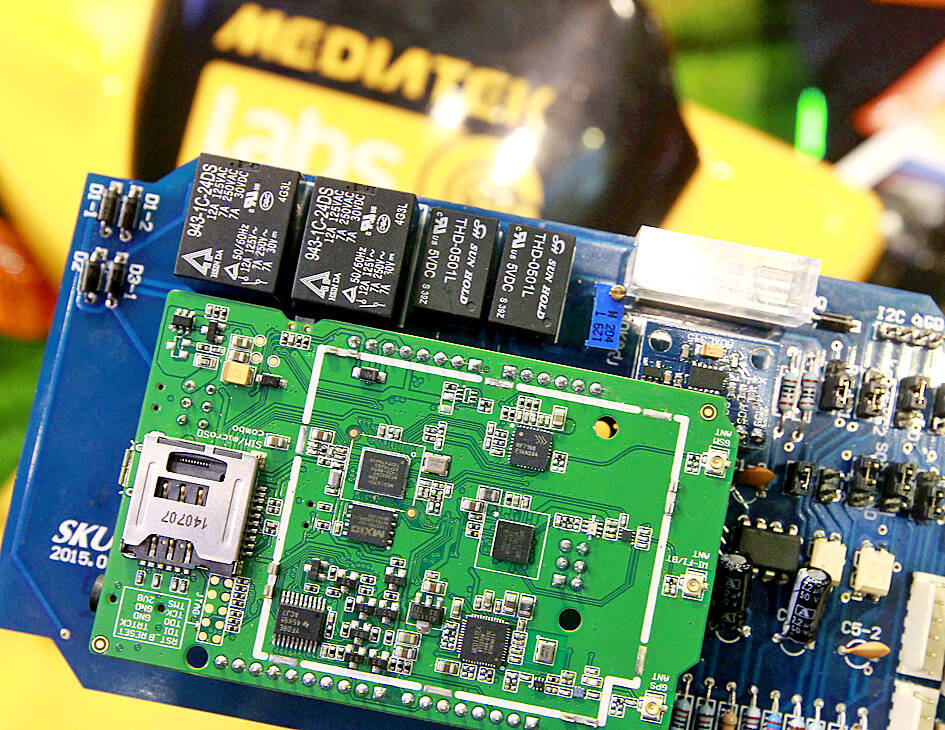The nation’s small and medium-sized IC design companies are to receive subsidies from the Ministry of Economic Affairs to develop chips more advanced than 28-nanometer nodes, the Central News Agency (CNA) reported on Sunday, citing sources from the Industrial Development Bureau.
As part of the government’s 10-year plan to develop Taiwan into a pivotal hub for IC design with a significant presence in the global market by 2033, the ministry plans to allocate NT$800 million (US$25.06 million) to subsidize local small and medium-sized IC design firms, the report said.
Companies might receive a maximum subsidy of 50 percent of what they request to focus on artificial intelligence, smart vehicle or other high-performance chips, it said.

Photo: Pichi Chuang,Reuters
In addition to well-known IC designers such as MediaTek Inc (聯發科), Realtek Semiconductor Corp (瑞昱) and Novatek Microelectronics Corp (聯詠), there are about 200 small and medium-sized IC design companies in Taiwan, according to the bureau.
Detailed application terms are still under discussion within government agencies, which are expected to be announced early next year, the report said.
The plan needs to be reviewed and approved by the Executive Yuan, and the ministry aims to launch it next year, it said.
The US last year imposed strict controls on exports of chips more advanced than 28 nanometers to China for 10 years, a move that experts said would lead China to focus on mature technologies like 28 and 40-nanometer nodes.
Taiwan’s small and medium-sized IC design companies are likely to face a price war from their Chinese peers, as local firms’ main business focus is 28-nanometer technology at present, with only a few having the capability to develop 16-nanometer chips, bureau officials said.
For many small and medium-sized IC design companies, developing advanced nodes such as 16 and 14 nanometers poses a considerable burden on their finance, costing more than NT$100 million and warranting subsidies from the government, bureau officials said.
In March, MediaTek chairman Tsai Ming-kai (蔡明介) said the government should pay more attention to IC design companies instead of semiconductor makers and called on policymakers to propose at least NT$10 billion to assist the local IC design industry given the rising competition from China.
The National Science and Technology Council last month unveiled a 10-year initiative aiming to increase local IC design companies’ global market share to 40 percent by 2033 and to achieve an 80 percent global market share for advanced semiconductors of 7 nanometers or below. The council is planning a budget of NT$12 billion for the initiative next year.

TRAGEDY STRIKES TAIPEI: The suspect died after falling off a building after he threw smoke grenades into Taipei Main Station and went on a killing spree in Zhongshan A 27-year-old suspect allegedly threw smoke grenades in Taipei Main Station and then proceeded to Zhongshan MRT Station in a random killing spree that resulted in the death of the suspect and two other civilians, and seven injured, including one in critical condition, as of press time last night. The suspect, identified as a man surnamed Chang Wen (張文), allegedly began the attack at Taipei Main Station, the Taipei Fire Department said, adding that it received a report at 5:24pm that smoke grenades had been thrown in the station. One man in his 50s was rushed to hospital after a cardiac arrest

A car bomb killed a senior Russian general in southern Moscow yesterday morning, the latest high-profile army figure to be blown up in a blast that came just hours after Russian and Ukrainian delegates held separate talks in Miami on a plan to end the war. Kyiv has not commented on the incident, but Russian investigators said they were probing whether the blast was “linked” to “Ukrainian special forces.” The attack was similar to other assassinations of generals and pro-war figures that have either been claimed, or are widely believed to have been orchestrated, by Ukraine. Russian Lieutenant General Fanil Sarvarov, 56, head

SAFETY FIRST: Double the number of police were deployed at the Taipei Marathon, while other cities released plans to bolster public event safety Authorities across Taiwan have stepped up security measures ahead of Christmas and New Year events, following a knife and smoke bomb attack in Taipei on Friday that left four people dead and 11 injured. In a bid to prevent potential copycat incidents, police deployments have been expanded for large gatherings, transport hubs, and other crowded public spaces, according to official statements from police and city authorities. Taipei Mayor Chiang Wan-an (蔣萬安) said the city has “comprehensively raised security readiness” in crowded areas, increased police deployments with armed officers, and intensified patrols during weekends and nighttime hours. For large-scale events, security checkpoints and explosives

PUBLIC SAFETY: The premier said that security would be tightened in transport hubs, while President Lai commended the public for their bravery The government is to deploy more police, including rapid response units, in crowded public areas to ensure a swift response to any threats, President William Lai (賴清德) said yesterday after a knife attack killed three people and injured 11 in Taipei the previous day. Lai made the remarks following a briefing by the National Police Agency on the progress of the investigation, saying that the attack underscored the importance of cooperation in public security between the central and local governments. The attack unfolded in the early evening on Friday around Taipei Main Station’s M7 exit and later near the Taipei MRT’s Zhongshan